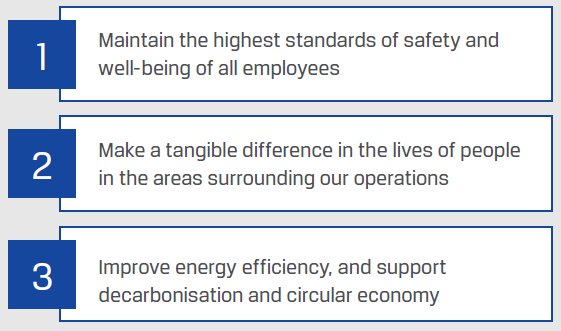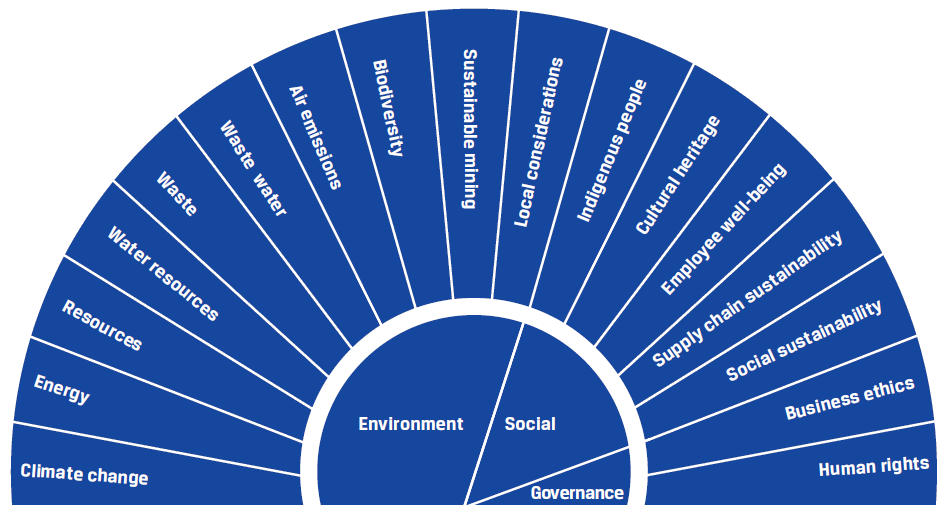
STRATEGIC FOCUS AREAS > S6
MAINSTREAMING SUSTAINABILITY IN BUSINESS IMPERATIVES
S6
MAINSTREAMING SUSTAINABILITY IN BUSINESS IMPERATIVES
As one of India’s leading steel players, we have undertaken several initiatives across our operating areas to build and operate a sustainable steel value chain. With sustainability at the core of our corporate strategy, we strive to be a force for good, driven by responsible business conduct that enhances the lives of communities and nurtures the environment.

JSW Group’s Sustainability Vision
It is our Vision here at JSW that we are able, both now and in the future, to demonstrably contribute in a socially, ethically and environmentally - responsible way to the development of a society where the needs of all are met, and to do so in a manner that does not compromise the ability of those that come after us to meet the needs of their own, future generations.
Material issues
ENVIRONMENT
M16 M17 M19 M20 M21 M22 M23 M24 M25SOCIAL
M26 M27 M28 M29 M30 M31 M32 M33GOVERNANCE
M34 M35 M36 M37Action plan

Strategic drivers and operating context
There is an increasing focus on how businesses are evaluating the risks and opportunities arising from key Environmental, Social and Governance (ESG) matters. In this respect, steel is a sector that mobilises and manages an enormous workforce and touches the lives of society at various levels, apart from contributing to nation-building.
Steel is also deemed as a resource-intensive sector and sustainable operations are highly relevant for steelmakers globally. Sustainability has emerged as one of the defining issues in the 21st century, especially for core industries such as steel, demanding an efficient business response.
Sustainability strategy
Our sustainability strategy is based on seven key elements, which together help us achieve our Sustainability Vision.

LEADERSHIP
Throughout our organisation, we provide our leaders with the skills and knowledge that will systematically enable them to oversee the implementation of our Sustainability Strategy and then ensure that it remains operational and effective.

STAKEHOLDER ENGAGEMENT
We readily recognise that while we have within our business a wealth of knowledge regarding sustainability, we do not know everything. Hence, each part of our business is regularly required to identify and subsequently engage with a wide range of people and organisations who have an interest in our activities – our stakeholders. The aim is to gain an understanding of the varied needs and expectations that our stakeholders may have from us and accordingly build our overarching Strategy that successfully fulfils them.

COMMUNICATION
Frequent and effective communication, both within our business and with our stakeholders, is seen as critical to ensure that everyone understands our Vision, our Strategy, and their role in making these things happen. As a subset of our Strategy, we will define how communication is to be managed from the site level up to the Group level. Additionally, we have also established an informative and accessible platform on the internet through which all elements of our Strategy, our policies in relation to various sustainability issues, our performance and our ongoing commitment to our Vision can be examined.

PLANNING
The broad range of issues covered by our sustainability strategy may not apply to every one of our sites. Besides the importance of a subject to one site may be different for another, based on the nature of the business, its location and the specific concerns of local stakeholders.
In any case, each of our sites are required to gain a thorough understanding of which and to what extent a particular sustainability issue affects them. This guides each site to develop an approach to manage those relevant issues.

IMPROVEMENT
In addition to identifying the key issues for each site and deciding on how best to manage them, our Strategy also requires our sites to explore all the potential opportunities for improvement. That improvement may come in a variety of forms such as improving efficiencies or reducing wastes; it may also be improvements in how we operate, in our processes; it could be improvements in our products, or in how we work with our suppliers. We make sure that our mechanisms for improvement link back to either the ‘needs of all’, one of our three pillars of responsibility: Social, Ethical or Environmental, or to our commitments to future generations.

MONITORING
We, at JSW, have recognised that none of our efforts with regard to planning and improving what we do will count for anything if we are not able to demonstrate them. That is why, our Strategy also places significant emphasis on identifying, from site to Group, the key performance measures through which we, and our stakeholders, can monitor our progress.

REPORTING
Sharing information on our performance, either at a local site level or using international standards such as the Global Reporting Initiative (GRI), is seen as key in fulfilling our commitment to ‘demonstrably contribute’. Openness with all our stakeholders is regarded critical to us, for only through such openness are we able to establish a real trust that what we are doing with regard to our sustainability strategy can, and will, deliver the vision we have. This report is part of the process.
Our sustainability framework, policy and focus areas
At JSW, we have developed a sustainability framework based on 17 key areas across various ESG facets. These have been identified after studying the magnitude of impact and the level of contribution we make to each one of them. All our sustainability interventions broadly fall under these focus areas. Generally, these focus areas are underlined with supporting policy statement(s).
We determined our focus areas by reviewing our existing set of sustainability policies. We examined globally relevant guidelines and frameworks that can apply to our operations and took into account the relevant requirements as applicable to our operations while formulating the policies. This ensures that we stay updated with the needs of a dynamic world and are aligned to making it a better place for everyone.
The key guidelines and frameworks that we have taken into consideration are:
- National Guidelines on Responsible Business Conduct (NGRBC) Principles
- United Nations Sustainable Development Goals (UN SDGs)
- International Finance Corporation (IFC) Performance Standards
- Organisation for Economic Co-operation and Development (OECD) Guidelines
- United Nations Guiding Principles (UNGP) on Business and Human Rights
- International Organization for Standardization (ISO) International Standards on Environment, Energy and Social Responsibility
- Principles of United Nations Global Compact (UNGC)
OUTLOOK
Long-term
Make conscious efforts to improve gender parity in employment
Continue focusing on quality management and improve HSE metrics
Continue focusing on conservation initiatives and incorporation of new technologies to reduce environmental footprint



